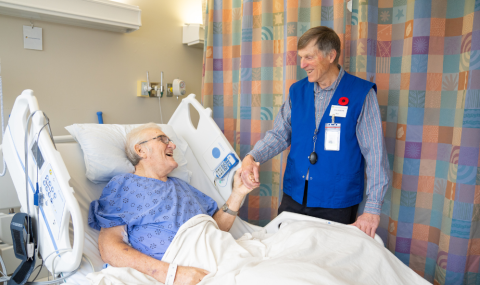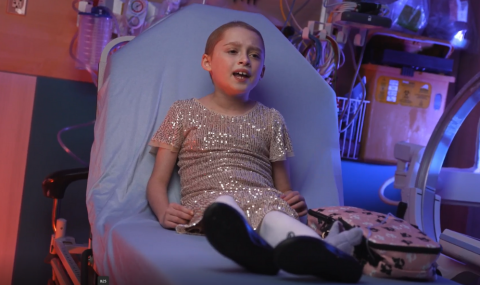MEDIA RELEASE
For Immediate Release:
October 27, 2011
LHSC celebrates the 60th anniversary
of the world's first cancer
treatment with Cobalt-60 radiation
LONDON, ON – On October 27, 1951, the world’s first cancer treatment with Cobalt-60 radiation took place at Victoria Hospital. This marked an important milestone for both the fight against cancer and Canada’s emergence as a leader in the field of radiotherapy. Today, London Health Sciences Centre is pleased to acknowledge the 60th anniversary of this tremendous medical breakthrough.
Revolutionizing cancer treatment throughout the world and serving as an excellent example of highly effective patient-oriented research, the Eldorado Cobalt-60 radiation technology, nicknamed the “Cobalt Bomb”, was first installed at LHSC on October 23, 1951. Just four short days later, its widely-publicized first medical use took place under the leadership of Dr. Ivan Smith. Click here to listen to archival broadcast coverage of this world first.
“The development of Cobalt-60 radiation therapy opened a window into the human body and for the very first time in history, we were able to treat deep-seated tumours without hurting the skin,” says Dr. Jerry Battista, Director, Physics Research and Education at LHSC’s London Regional Cancer Program. “This was the first major advancement in the radiation treatment of all cancers, aside from skin cancer, since Roentgen’s discovery of X-rays in 1895.”
Cancer treatment technologies have steadily progressed since the introduction of the mega-voltage period in 1951. Today, linear accelerators with more penetrating x-rays and built-in 3D imaging capabilities are used in most developed countries. These newer machines provide a more localized treatment of the tumour with fewer side-effects in nearby normal tissues.
Yet, despite the advances in technology, the Cobalt-60 unit remains the world’s main radiotherapy machine. Due to its cost effectiveness, reliability and ease of use, it is prevalent in developing countries. Cobalt-60 technology is currently used to treat roughly 70 per cent of the world’s cancer cases treated by radiation. LHSC’s last Cobalt treatment was delivered in 2001.
To date, approximately 35 million cancer patients worldwide have benefitted from this groundbreaking technology that was first applied at London Health Sciences Centre 60 years ago.
London Health Sciences Centre continues to be a leader in driving discovery and innovation. Our staff, physicians, and scientists are recognized internationally for the significant contributions they have made towards the advancement of medicine. We also teach thousands of health care professionals from across Canada and around the world. Through these activities, London Health Science Centre is improving the lives of people everywhere.
Dr. Battista is also the Chair of Medical Biophysics at The University of Western Ontario and a Scientist at Lawson Health Research Institute.
About London Health Sciences Centre
London Health Sciences Centre has been in the forefront of medicine in Canada for 136 years and offers the broadest range of specialized clinical services in Ontario. Building on the traditions of its founding hospitals to provide compassionate care in an academic teaching setting, London Health Sciences Centre is home to Children’s Hospital, South Street Hospital, University Hospital, Victoria Hospital, two family medical centres, and two research institutes – Children’s Health Research Institute and Lawson Health Research Institute, a joint research initiative with St. Joseph’s Health Care, London. As a leader in medical discovery and health research, London Health Sciences Centre has a history of over 50 international and national firsts and attracts top clinicians and researchers from around the world. As a regional referral centre, London Health Sciences Centre cares for the most medically complex patients including critically injured adults and children in Southwestern Ontario and beyond. The hospital’s nearly 15,000 staff, physicians, students and volunteers provide care for more than one million patient visits a year. For more information visit www.lhsc.on.ca .
- 30 -
For media inquiries contact:
Mandy Gelinas
Corporate Communications and Public Relations
London Health Sciences Centre
519-685-8500, ext. 75157 mandy.gelinas@lhsc.on.ca
After-hours assistance:
Call LHSC Switchboard at 519-685-8500 and ask to page the communication consultant on-call


